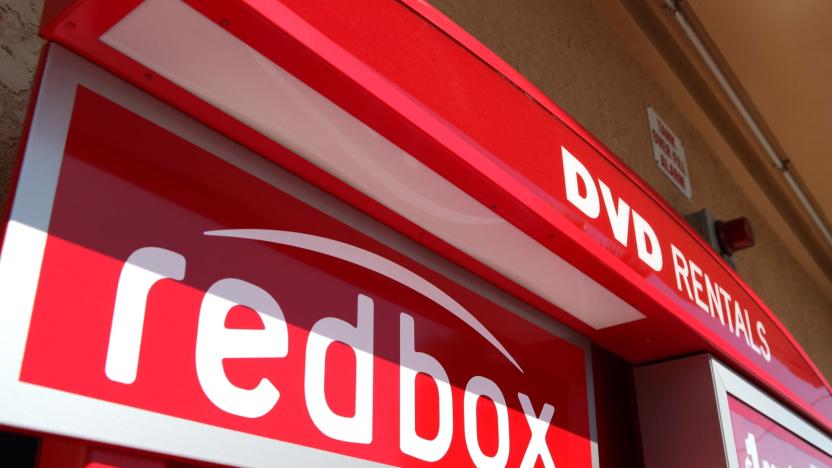FirstSaleDoctrine
Latest

Bethesda threatens lawsuit over sale of secondhand game
You can legally resell your personal games in the US under the First Sale Doctrine, which allows resales of copyrighted media like discs so long as you don't modify them in any substantial way. However, Bethesda doesn't think that applies if the shrink wrap is still present -- the publisher recently threatened to sue gamer Ryan Hupp for listing an unopened PS4 copy of The Evil Within 2 on Amazon Marketplace when he realized he didn't need that version of the game. As Hupp explained to Polygon, Bethesda's law firm viewed the listing as "unlawful" because he was not only unauthorized to resell new copies, but had rendered the game "materially different" by not including the original warranty.

Redbox says Disney lawsuit is a baseless attempt to stamp out rivals
Last month, Disney filed a lawsuit against Redbox claiming that the rental company was violating Disney's copyrights. Redbox buys the Disney discs it rents at retail and when those discs come with download codes for digital copies, Redbox sells them to its customers. But Disney says that's against its terms of sale and requested an injunction, any profits Redbox made from those sales and $150,000 per copyright infringement. Redbox has now clapped back, Variety reports, filing an opposition to Disney's complaint and injunction request.

Appeals court denies ReDigi appeal, says music downloads can't be resold
ReDigi took a gamble that it could resell legally purchased song downloads, much as you would that one-hit wonder CD you bought in high school. Unfortunately for ReDigi, the odds weren't ultimately in its favor: a Southern District of New York court has shot down ReDigi's appeal against a Capitol Records lawsuit accusing it of copyright infringement. The court didn't accept ReDigi's view that first sale principles apply to strictly digital music, at least as its service implements the technology. While the startup tries to keep traders honest by making them delete originals after a resale, the process by its digital nature still involves making a copy of the track without Capitol's permission, according to the court. We'll have to wait to know what penalties ReDigi might pay, but there's enough legal precedent in the case that it's doubtful others will follow in the service's experimental footsteps.

Disney considering 28-day rental window, because 'On Stranger Tides' was that good
That sound you can hear is the studios dashing around as they look for a new scapegoat. Disney's got Redbox and Netflix in its sights as it declares plans to impose a 28-day window before it'll make its titles available for rental. Despite conceding that the studio hadn't seen any impact on overall DVD sales, CEO Bob Iger pointed to a 16 percent drop in quarterly revenue compared to 2010 as the motivation. It's also collecting splinters in its backside as it watches to see how well digital locker service UltraViolet fares with consumers before committing to join the program. Of course, given the legitimacy of First Sale Doctrine, it's possible Redbox will do as its done with Warner titles and just buy 'em at retail -- as long as it can cover its costs as it does so.

Redbox refuses to push Warner movie delay to 56 days, will rent flicks as they go on sale
Two years after bending to Warner's demands and delaying its kiosk rentals 28 days in exchange for lower acquisition costs and a steady supply of Blu-ray discs, Redbox announced the agreement has expired. This comes as a result of Warner's desire to extend the delay between the time movies are available for purchase to the time they can be rented in kiosks or by subscription to 56 days, and instead Redbox will go back to buying the studio's movies at retail -- coincidentally, it has renewed its lease agreement with Walmart for 3,700 retail locations for three more years. While that means more expense and possibly unsure supply for Redbox -- we'll wait and see if retailer interference is an issue again -- the good news for consumers is that for the time being, they'll have the choice of renting as soon as movies go on sale. The first flick affected by the new reality is A Very Harold & Kumar Christmas, so until Warner backs off, or Redbox blinks once its streaming service comes into play, then go forth and enjoy those $1.10 rentals freely.[Thanks, Stephen]

Redbox passed 30,000 kiosks in Q4 2010, but still missed financial expectations
Redbox may be a red-logoed stepchild compared to industry darling Netflix, but according to its parent company Coinstar's Q4 earnings call, it still managed to pass the 30,000 kiosk milestone, increase market share to 30 percent and grow DVD revenue by 38 percent to $319.6 million. Combined with blowing by one billion rentals back in September and avoiding a lawsuit with Fox, the news would have culminated in champagne and karaoke for Coinstar shareholders... except for one thing: new releases underperformed during the last quarter along with Blu-ray rentals. Coinstar CEO Paul Davis was quick to bolster investor concerns on the call, however, stating company management had taken "definitive steps to correct the issues" and was ready to "leverage the First-sale doctrine" -- which refers to a Supreme Court ruling limiting the control of copyright holders over the re-selling of its property -- should studios get sassy in future distribution negotiations. More updates on the company's streaming plans didn't materialize, though, so you'll have to chuck those dreams of instant rental gratification for a buck back in the deep freeze at least in the near term. Otherwise, hit up the source links below to ogle data tables to your heart's content.

Psystar, Apple file motions for summary judgment
Apple and Psystar have been embroiled in litigation for quite a while now. At the core of the dispute: Psystar modifies Apple's operating system software so that it can run on its clone machines. It then sells its computers with Mac OS installed to, well, anybody who wants one. As you can imagine, this does not make Apple happy. Anybody familiar with The Great Clone Crackdown of 1997 will tell you that Apple likes to keep a very tight grip on any device that presumes to run its software. Apple points out that Windows machines are a mishmash of often conflicting hardware and suffer from quirks and errors and incompatibilities that such a set up can bring. So Apple's cadre of lawyers descended quickly on Psystar. In July of last year, the company sued Psystar for copyright and software licensing violations, quickly amending its lawsuit to additionally charge Psystar with violations of the Digital Millennium Copyright Act (DMCA). And there was much lawyering. More than a year later, now that discovery has been completed, the two parties have each filed for summary judgment, which, in effect, asks the judge to rule in favor of the filing party because enough evidence has been shown that either makes or breaks the lawsuit. Psystar's argument, and the one covered in its motion, somewhat relies on the "first sale doctrine" which says that any purchaser of a copyrighted product can then take that lawfully-made copy and sell it, so long as no additional copies can be made. For its part, Apple says that when one "purchases" its OS, you are only purchasing a license to use the product. Its Software Licensing Agreement (SLA) quite clearly states [PDF link to Snow Leopard SLA] that the user cannot modify the software to run on a non-Apple system. The idea that what you are purchasing is a license to use the product is pretty commonplace among software manufacturers, because, the argument runs, you can cut any software company's profits off at the knees if every purchaser became an owner with free rein to redistribute the software. Apple states that no software company in its right mind would put the money into research and development of any software product at all if that were the end result of bringing its product to market. Groklaw suggests this could have ramifications for FOSS and and the GPL.

Psystar's lawyers regroup, try another tactic against Apple
So it looks like wannabe cloner Psystar's supposedly hotshot law firm of Carr and Ferrell regrouped for a deep think after pumping out some fairly weak arguments in its case against Apple -- according to a new draft of Psystar's countersuit, the Florida-based computer reseller should be allowed to sell whitebox Mac OS X machines because it legally purchased copies of Leopard at retail. That's the first sale doctrine, if you're into copyright law -- it states that the purchaser of copyrighted materials (like a book) can sell or dispose of them however they want. Here's the thing though: a big part of Apple's case (but not all of it) is based around the fact that consumers license OS X under the terms of the EULA -- and courts are basically up in the air over whether the first sale doctrine should apply to software transactions. It's an interesting tactic with a ton of repercussions beyond Apple if it's successful, but we honestly can't see it working -- in the cases where first sale has been used to overcome a EULA, it's generally been for used software, not companies like Psystar, who are modifying and installing new copyrighted software sold by a first party. We'll see how Apple responds -- things just got interesting again.Update: World Of Apple notes that this argument has been present from the outset, but it sounds like Psystar's really pushing it now. We'd say so -- we think it's the only plausible one we've heard so far.[Thanks, iB3nji]Disclaimer: Nilay's a lawyer and about to fall over from CES, but he's not your lawyer, and this isn't legal advice or analysis.



